The Enduring Harms of Trump’s Muslim Ban
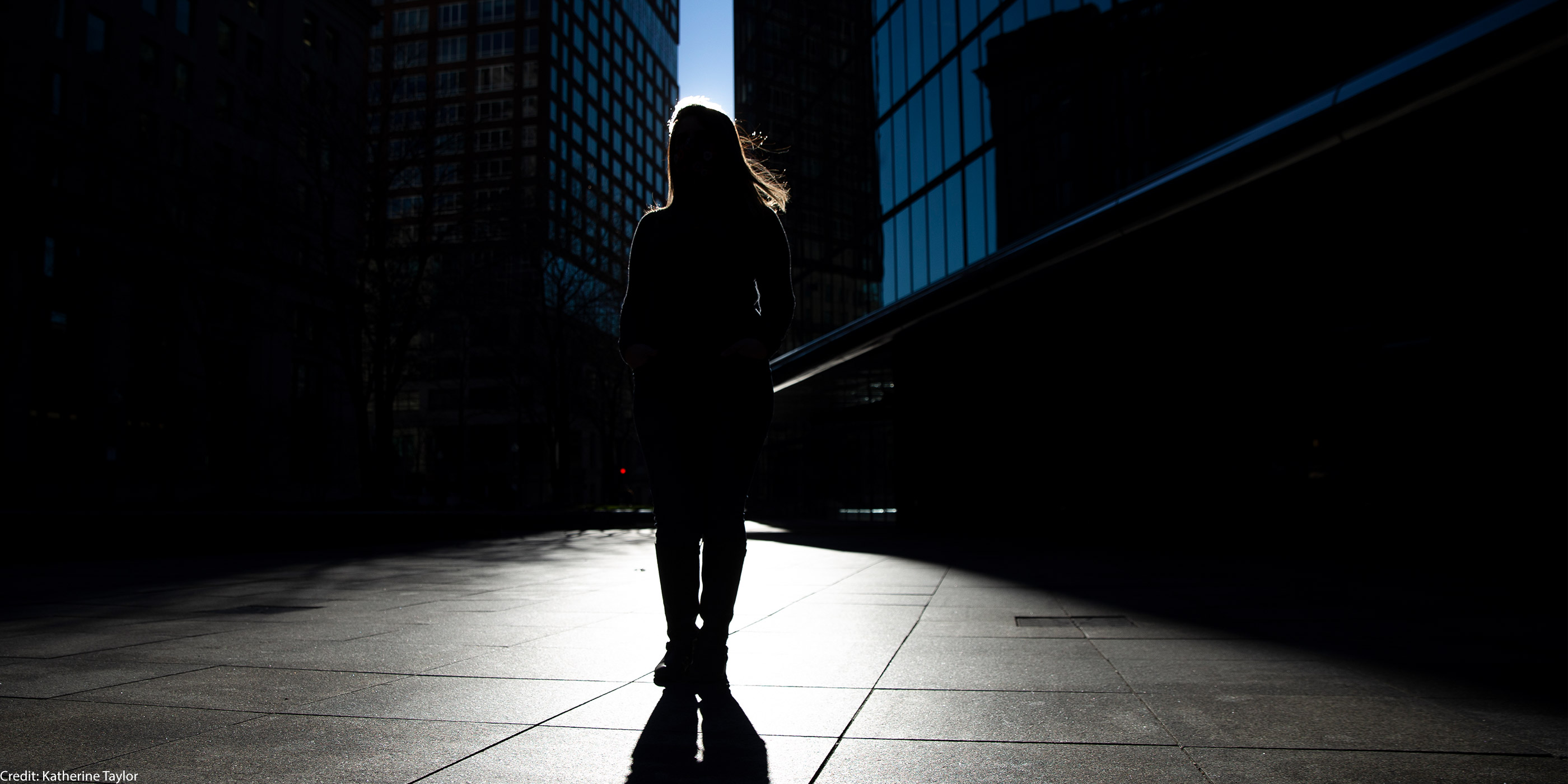
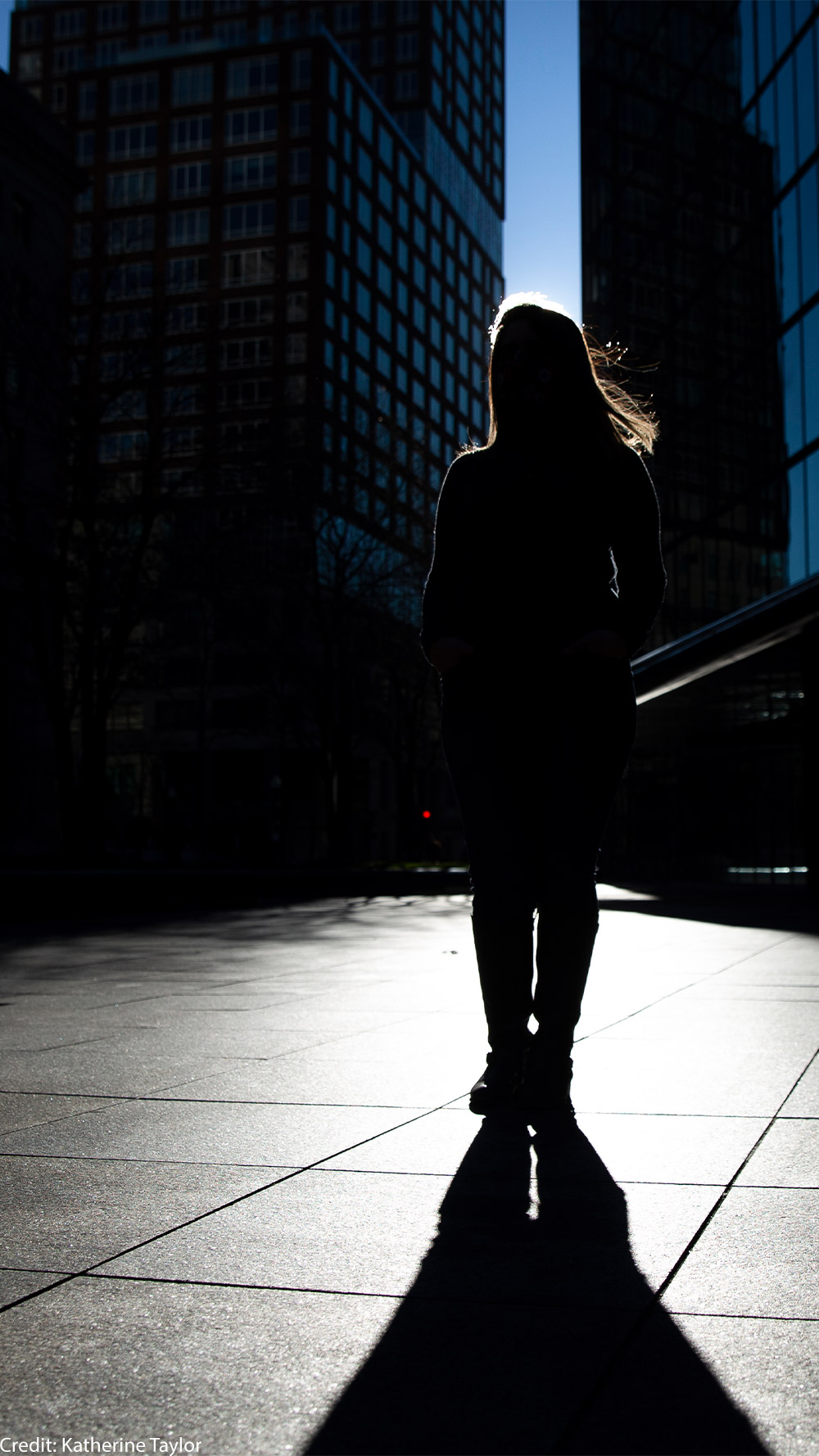
As the Trump presidency draws to an end, we near the 4-year anniversary of the birth of one of its defining and most damning legacies: the Muslim ban. When Trump implemented his first Muslim ban, the public response was immediate. Crowds of protesters flooded airports in support of Muslims and other impacted communities who were immediately being detained or turned away all over the country. Lawyers and immigrants’ rights organizations nationwide, including the ACLU, filed a series of lawsuits as court after court ruled to block the ban. Despite the backlash, Trump issued new iterations of the ban to circumvent the law and conceal its real purpose, which in his own words was to block Muslims from entering the United States. Ultimately, the Supreme Court allowed the third iteration of the ban to be implemented. The Trump administration then further expanded the ban, explicitly targeting Africans. As a result, people from 13 countries still remain barred from coming to the U.S.
Four years after the Muslim ban became a reality, families still remain separated, people are unable to celebrate life events or mourn the loss of loved ones, and dreams are faltering for millions of people worldwide. The stories of Neda, Anwar, Farah, and Haya show us how the Muslim ban has derailed lives and will continue to do so until President-elect Biden rescinds the ban.
FARAH
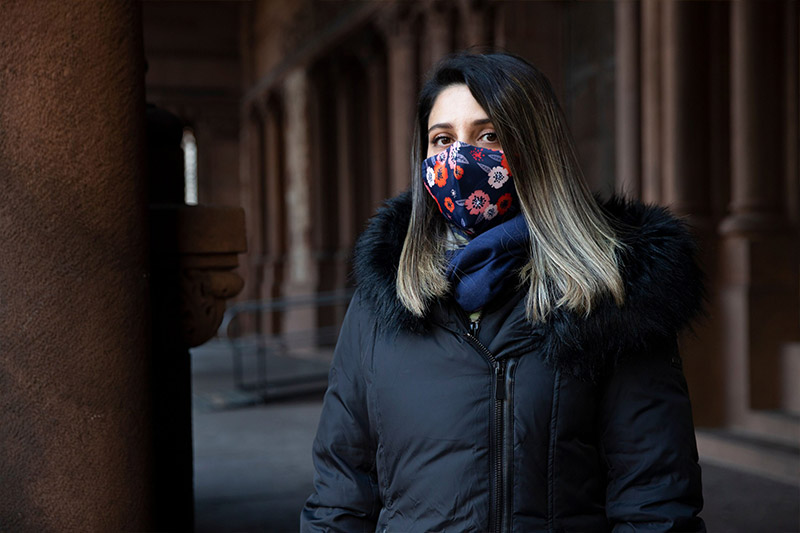
Photo by Katherine Taylor
Throughout my life, it’s never been easy for an Iranian person to come to the U.S. through the usual channels that a person of any other nationality would be able to go through without hassle. It has always been a super scrutinizing process. The background checks can take up to a year even for a simple visitor visa. I know this process very well, since I have been trying to bring my parents here for almost a decade.
My sister and I moved to the U.S. in 2011 for a better life and to join our brother who had moved to the States four years prior. Ten years later, my brother is a dentist, my sister is an architect, and I am an attorney. We have all built lives and families here. My parents have never been able to enjoy our success because they cannot be with us.
In 2017, my brother finally became a U.S. citizen, and we were so excited to bring my parents over through a family-based immigration process. By the time we could apply, the Muslim ban went into effect and we had to kind of give up any hope on getting my parents here. At the same time, it was so scary because of the uncertainty about what it meant and how it would affect people. My siblings and I spoke with various attorneys, and nobody knew anything. That was the scariest part, just not knowing how the ban would affect everyone. We decided to try applying for them anyway, hoping that the ACLU and other amazing attorneys would be able to get the ban overturned at the Supreme Court. Four years later, we are still separated because of the Muslim ban.
My parents have had to miss so much in our lives. I’ve been with my husband for 8 years and married to him for 2 and my parents have never met him. They have never met my brother’s wife either. They had to attend our weddings and graduations via FaceTime. I know it’s difficult for them, not knowing when or whether they will ever see their children again, but they try not to show it. They’re hopeful that things will change at some point and they’ll be able to come here and meet all these important people in our lives.
My parents have never been able to enjoy our success because they cannot be with us.
I love America and its people. But I wish we would look at Muslims and other people perceived as different as people instead of attaching qualities or preconceived notions to them. It’s very cliche, but that’s the first step in understanding anybody outside your own little bubble. If we’re going to change anything for the better, that’s where it has to come from — trying to understand people who don’t necessarily look like you or have the same religion.
What I miss most about my parents is their constant bickering. They are best friends, and cannot be away from one another for more than two seconds. They’ve been married for over 40 years and they never run out of things to talk, laugh, and bicker about. They have set an example that I’ve spent my whole life finding — that friendship in marriage.
For the past eight years, my in-laws have been my surrogate parents here, and I can’t wait to put those two sets of parents together and just watch them interact. My parents’ English is not amazing, but I’m sure they can communicate through the language of love. I can’t wait. There are so many places we want to take my parents and so many people we want them to meet. It’s been so long and it feels so unattainable. I get emotional just thinking about it.
Note: 'Farah' is a pseudonym used to protect her privacy.
ANWAR
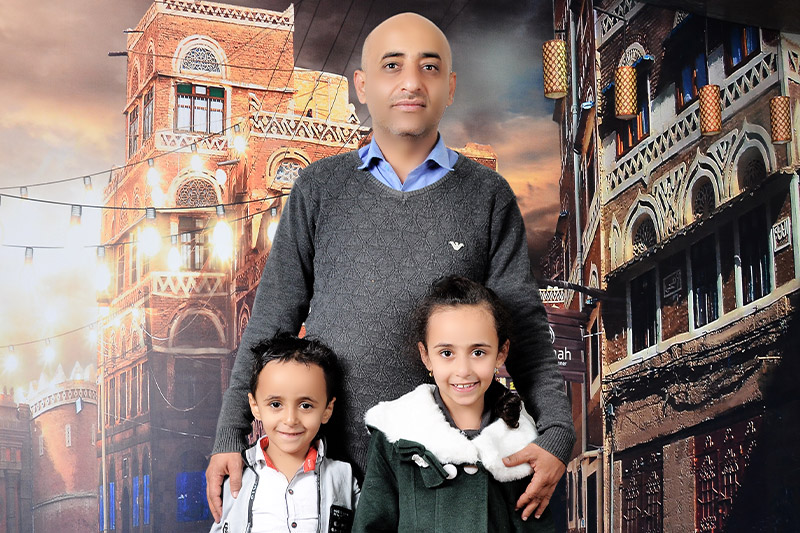
Anwar and his children, Nadra and Mazeen.
A few years ago, I was announced a winner in the American immigration lottery. I then began a long and tiring journey to get my visa. The war in Yemen made the process extremely difficult. Many airports and government buildings were closed. In order to get my passport, I had to move as fast as I could through militant-controlled areas to reach the city of Maarib. Along the road, there were checkpoints where soldiers would investigate passengers and verify IDs and travel plans. The journey took more than 16 hours
Once we had our passports, my wife and I sold all of our possessions and borrowed money from friends so we could travel to Djibouti because there is no American embassy in Yemen. It was a challenge just to get there. Travelers from Yemen must first go to Egypt or Sudan to get entry visas from an embassy in Cairo or Khartoum.
After I finally arrived in Djibouti, I had to spend months there. During that time, I lost my job and spent all the money I had saved. I was miserable because I had pledged to repay my friends as soon as I arrived in America. Eventually, my visa was denied because of the Muslim ban.
I had dreamed that my two young children, Nadra and Mazeen, would get to live away from the war and poverty in Yemen, that they would get an education and build a wonderful future. But we are still living in Yemen, where the state of the country is deteriorating every day. Now, thinking about the future frustrates us. It feels as if our dreams are slipping away, and we fear we may find ourselves unable to educate our children or provide them with food and medicine.
Still, we are hopeful that the Muslim ban will be lifted. We trust America, its constitutional institutions, and the justice system. We want the new American government to hear our voices and rescind this ban retroactively so that my lottery visa is not lost. I am optimistic that they will. Coming to America would help me guarantee a safe life for my family and a bright future for my children.
HAYA
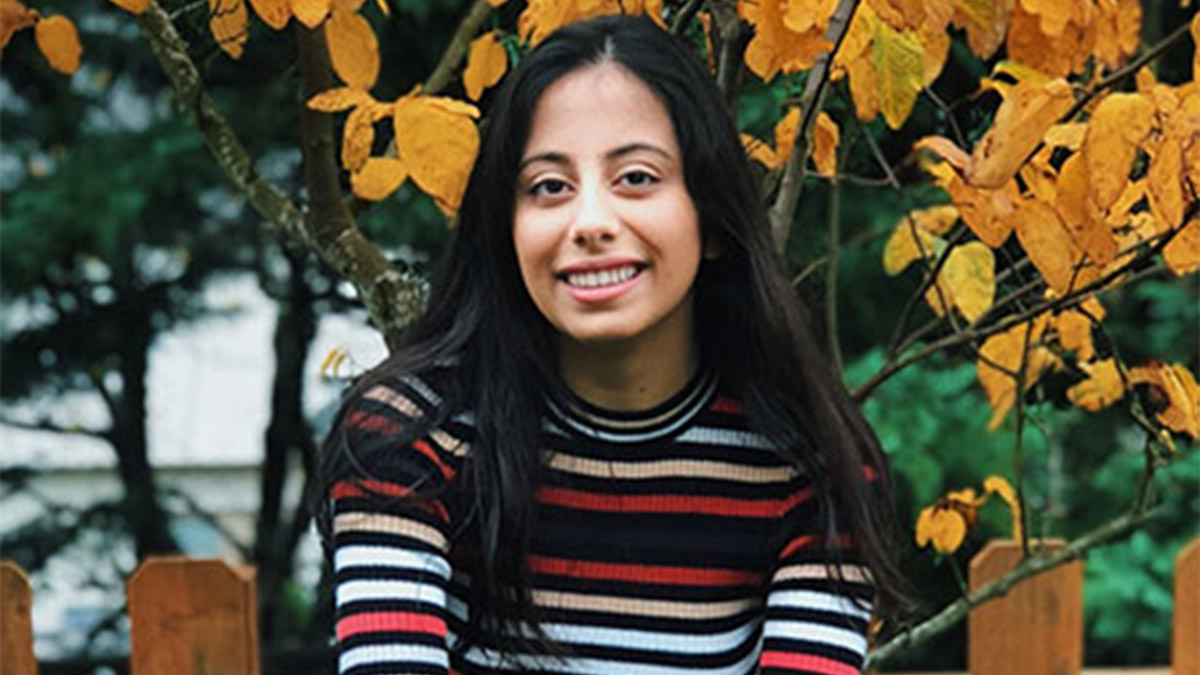
I was in high school when President Trump started talking about banning Muslims during his campaign. As a Syrian American, I had become accustomed to the discriminatory immigration system, especially after 9/11. But here was Trump literally saying, I’m going to ban Muslims, live on TV. Just hearing those words was confirmation that people like me and my family are not equal. It felt like violence.
The words hurt, but I didn’t think Trump was being serious. I thought it was all for show. Even if he tried to enforce a ban, I was sure that some court would block it. There was just no way I could imagine America enforcing the ban, even though it basically just put onto paper all the discriminatory immigration policies my family had been dealing with since 9/11.
So I was horrified when, just a few days after he took office, he made his Muslim ban a reality by signing the executive order. I was a senior in high school at the time — just a few months away from graduating. Because of the Muslim ban, my parents and 14-year-old sister could not get visas, so I had to attend my graduation alone. It was traumatic for me emotionally, to be physically separated from my family at a time like that. And I couldn’t even communicate with them freely because where they live, there’s no freedom of speech. So if I talk about politics on WhatsApp, for example, I could put them in jeopardy. It was just a really bad separation, and I felt it deeply.
I couldn’t believe that a country that prides itself on its commitment to freedom and justice would close its doors on refugees and immigrants seeking help.
I am the only U.S. citizen in my immediate family. My parents came here from Syria to build a better life, one free of oppression. Due to my dad’s job, however, we had to relocate a few years later back to the Middle East. There, I spent much of my childhood living between Saudi Arabia and the United Arab Emirates, visiting family and friends in Syria for holidays or special occasions. When the war in Syria broke out in 2011, though, that became increasingly difficult. After the Muslim ban became a reality, we felt trapped. We couldn’t return to Syria because of the war. We couldn’t live permanently in Saudi Arabia or the UAE because we are not Saudis or Emiratis. Now we could not go to the U.S. — at least, not as a family. We were stuck. Out of desperation, my parents decided to reach out to distant family members in Canada and see if we could immigrate there as refugees. That’s where we are today.
I am currently in university, studying political science. When I first wrote to the ACLU in 2018, I said I couldn’t believe that a country that prides itself on its commitment to freedom and justice would close its doors on refugees and immigrants seeking help. I knew that was not what America was supposed to be. That’s why I am optimistic that the new administration will rescind the Muslim ban and restore hope to families like mine that have been separated for too long. It would be an important first step in reforming racist immigration policies, especially from the post-9/11 era. I dream that one day, the country I was born into will treat me as equal instead of discriminating based on nationality and religion.
NEDA
I am a member of the Baha’i faith, a religious minority that faces discrimination in my home country of Iran. I immigrated to the U.S. because I wanted to live in a place where I would not be discriminated against because of my name or religious customs. For the past several years, I have worked as a caregiver for elderly patients.
When the Muslim ban was announced, I did not think I would be affected because I am a U.S. citizen and I am not Muslim. A few months later, when I applied for a visa to bring my fiancé here, I learned that I was wrong. My application was rejected immediately. I didn't know it was possible to be treated this way in America. I was used to facing discrimination in Iran, but discrimination feels different when you’re not in your birth country.
I’ve now been trying for years to bring my fiancé here. Most recently he had an interview at the U.S. consulate in Istanbul. I was hopeful that this time we would be successful and went to meet him there. But the consulate just gave me a waiver and told me to apply again. I filled out all the paperwork again and still, I am waiting. My fiancé and I were supposed to be married by now and living in America, our new home. Instead, we are stuck in limbo, still separated because of the Muslim ban.
I don’t want to keep hearing the word sorry.
The past few years have been mentally exhausting. Every time immigration officers tell me to do this or that, I have to get a lawyer, I have to do interviews, I have to pay a lot of money. I have friends and family who have gone through much worse because of the Muslim ban. One of my friends had a baby, and her mother could not get here to be by her side for the birth, even though she had a visa. My niece was hospitalized after a car accident and her husband, who was in Iran, was not able to come. A lot of families are separated, with one part here, another part there, unable to reunite during difficult times.
At work, a lot of my coworkers know about the problem with my fiancé. They keep asking if there’s news, if he got here yet. And when I say no, they always say sorry. I don’t want to keep hearing the word sorry. I don’t want to be treated differently. I just want to be a citizen like everybody else. It’s my right to live here with my fiancé. I have no choice but to keep trying. I won’t give up.
Note: 'Neda' is a pseudonym used to protect her privacy.

